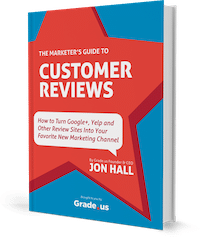Does reputation management have you seeing stars? What really makes for a great online review?
I wish I could tell you that there’s a “one-size-fits-all” approach to online reputation management.
The reality is that everyone digests online reviews differently.
The woman who’s searching for a new doctor will be looking for different types of information than the man who is deciding on which baby stroller is best for his 2 year old.
Online behavior is a funky and fickle beast. While there’s no denying that people depend on reviews sites more than ever, people are more discerning of the types of reviews that influence their purchasing decisions, than they’ve been in the past.
Think about how you sift through reviews when researching a product. If you’re looking to book a reservation at the perfect hotel for your vacation to Bali, what are the important factors that would influence your search?
Some vacationers might be focused mainly on price and value, whereas others might require certain amenities and a prime location.
Star ratings will lure a prospective customer into investigating your reviews, but real persuasion happens in the written content.
So what constitutes a valuable review for your business?
Here’s what to look for:
- It has decent star rating attached
- It is substantial, and therefore credible
- It is recent and corroborated by other, similar opinions
The Stars Must Align

It makes sense that star ratings have the biggest impact on us when we’re browsing reviews. That visual cue is typically the first thing our eyes gravitate towards when comparing different solutions.
The Search for the Great Steak Enchilada

When people read reviews, they typically have a specific need and are either looking for experts to guide their decisions or someone similar to themselves that can inform them on the practical benefits of a product or service.
Imagine coming across a Mexican restaurant listing with 100 reviews, almost all of them 4 or 5 stars.
You think to yourself, “Oooooh, this place looks good! It’s not too far from me. It’s in my price range. Seems to be universally liked. I wonder how tasty their steak enchiladas are.”
Then, you begin to read what people actually have to say about their experience at the restaurant and you start to see a common theme:
“Great food!”
“This was exactly what I was looking for.”
“Gud stuff. Nom Nom Nom.”
Well, they seem to all be positive, but they don’t exactly inform us what’s ‘great’ about the establishment.
Has anybody tried the steak enchilada?
I’ve had bad enchiladas before, and I bet I can find a different restaurant that’s known for their enchiladas.
Not all written reviews are created equal. A concrete argument with specific details not only makes the reviewer more trustworthy, in that, you can tell they’ve actually used the product, but a specific detail of the experience might actually help the consumer solve their problem.
In the case of my delicious future steak enchilada, if only I had seen a review specifically mentioning my dish.
“The meat was tender and had a smokey flavor that I didn’t expect! The tortilla was fresh and had a hint of sun dried tomatoes. Thankfully, they did not skimp on their tangy and spicy chipotle sauce.”
I love chipotle sauce! I’m sold. Blog post timeout. I need to go get some enchilada action.
See how a concrete review had much more value to me than someone simply writing “nom nom nom”?
One of These Things is Not Like the Other
Say you’re looking for the best mini golf course in town. If you’re down at the Jersey shore, there are plenty of mini golf courses to choose from.
You find a local course and see 15 reviews that are all raving about the design of the holes and the creative elements of the course in great detail. Then you see one review that complains about how the course lacks creativity.
People will ignore that one bad review, because it doesn’t fit in with what everyone else is saying.

Maybe Happy Gilmore decided to take his aggression online after his evil clown encounter.
You’re likely to think that the 14 similar reviews were on to something, and that one negative review is probably from a chronic whiner, or someone who just had a really bad day and took it out on the poor mini golf course review listing.
Consistency across reviews adds to the credibility of the golf course. While the outliers might provide a strong argument, and be taken into consideration by consumers, they do not have the same impact on the customer’s perception of the business.
Pro-tip: When you’re prompting a customer for a review, use persuasive copy that highlights the importance of specific reasons why they loved your product.
Their Last Review was 3 Years Ago?
A review from this past week is more important than one last year. There’s nothing more frustrating than sifting through reviews only to realize that the most recent review was in 2013.
A lot can change for a business in one year, let alone three!
A review written after 6 months only has relevance to 16% of people. That means that if you haven’t earned a review in half a year, you’re doing a huge disservice to your business.
Funneling reviews for your business is an ongoing process. It’s not like you can earn 20 reviews, give yourself a pat on the back, and abandon any efforts to continue to secure online reviews.
Ask and Ye Shall Receive
When companies request reviews, the customer is doing a favor for the business.
Simply asking for a review from a recent customer though isn’t enough. People write reviews to help others, yet the average person doesn’t know what constitutes a good review, let alone how to write one.
If you’re asking your customers for reviews, you need to provide a little guidance. By highlighting the importance of the written part of the review, as well as distinctly asking for the customer to address specific attributes of their experience, you’re setting reasonable expectations for your customers to be able to provide valuable reviews.
About the Author
Garrett Sussman
Garrett is the Head of Marketing at Grade.us, an online review management and marketing platform. When he's not crafting content, he's scouting the perfect ice coffee, devouring the newest graphic novels, and concocting a new recipe in the kitchen.











